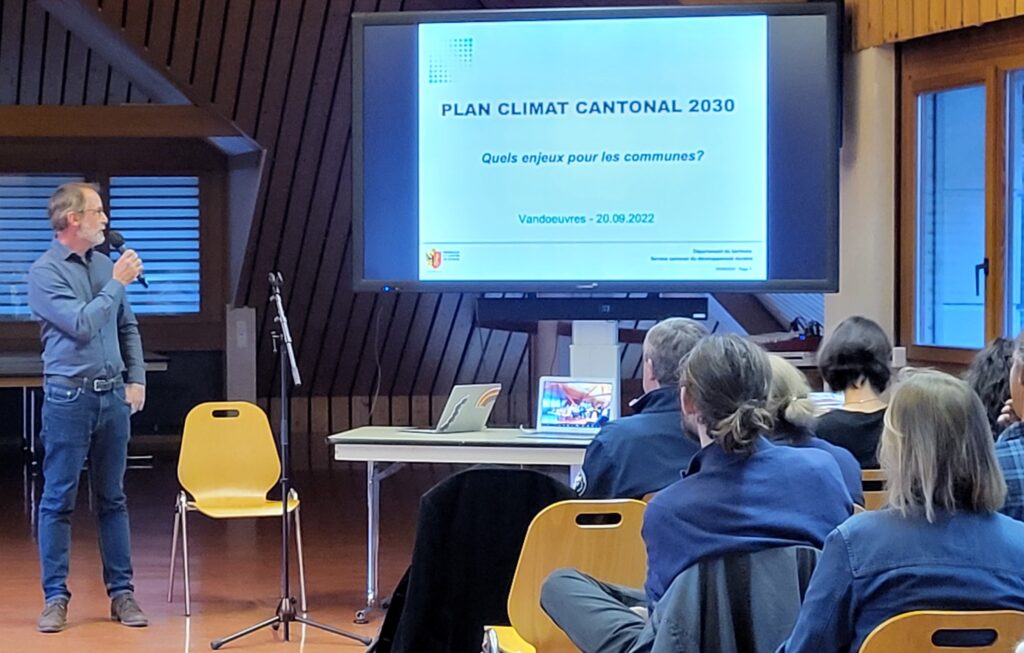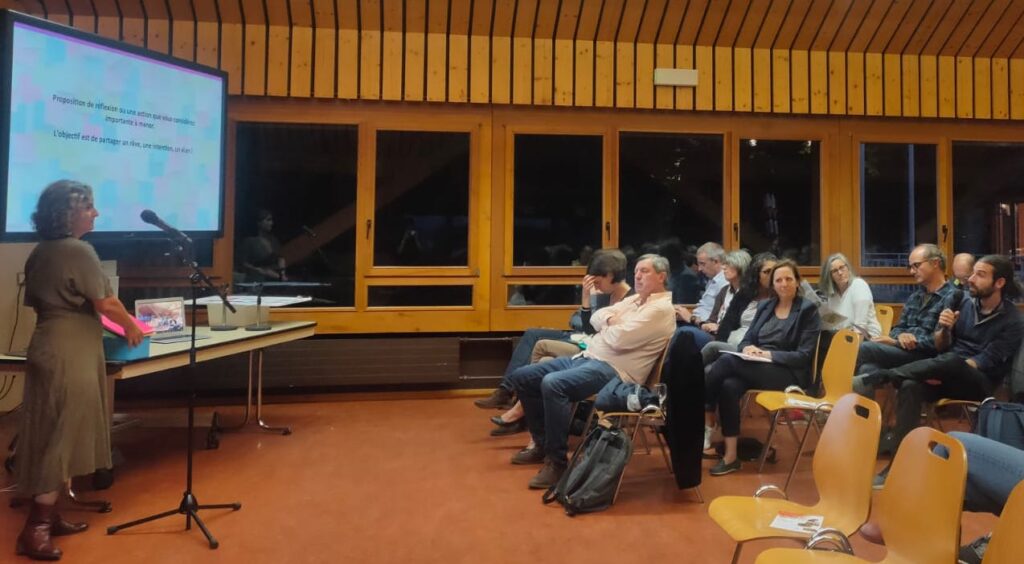Date & Place: 20 september 2022 | 19h-20h30 | Salle des Combles, Vandœuvres
The main objective of the European DIALOGUES project in its Geneva case study is to help residents move up the ladder of citizen participation, from information to debate, and to define what energy citizenship means in the communes of Vandœuvres, Collonge-Bellerive, Choulex and Meinier over the next 5 months. The launch event on September 20, 2022, in Vandœuvres, organized in collaboration with citizen collectives and communes, was a success.
Our first topic of discussion was the current challenges and opportunities for citizen participation in the energy transition in Geneva, within the framework of the cantonal energy and climate plans, and the ways in which residents are engaged in action today.
The objective was to prepare the ground for the DIALOGUES series of events while showing residents that their participation is highly appreciated and that the municipal authorities are listening. More than thirty residents attended the event, showing their interest and the strength of their feeling on the subject.
Madame Laurence Miserez, the mayor of Vandœuvres, welcomed participants with a strong message about how citizen participation is so crucial to generating new ideas and preparing people to be actors of change.
Mr. Damien Gumy, from the cantonal department of sustainable development, gave an overview of the ecological and climatic challenges of our region, summarizing in depth to the participants what the cantonal climate plan contains. Mr. Gumy gave us an overview of the probable carbon emissions of the communes of Collonge-Bellerive, Choulex, Vandeouvres, and Meinier and described point by point the priority areas of action in energy production, mobility, heating, and biodiversity. Access the presentation HERE.

Prof. Marlyne Sahakian, University of Geneva, picked up the thread and explored how we interpret the need for change in our daily lives. Provocative questions followed, showing the need for dialogue. How can we imagine our roles not only as consumers but also as people involved in our communities? Are we ready to imagine collective change and a new vision of a good life? Access the presentation HERE.

After these questions, the moderator, Mr. Maurizio Notarangelo, from Communotech and a citizen of Meinier, warmly encouraged the inhabitants to put themselves forward and share the actions they carry out in their daily life.

Several citizens came to give their testimony. A member of the Collectif Citoyen Collonge-Bellerive presented a clothing exchange organized to sensitize teenagers to “fast fashion” (while finding good deals!). Several other examples were shared at Meinier and Choulex. For example, in Choulex, the residents meet every 21st of the month and organized a garden clean-up event this summer, where seniors were helped.
As these inspiring examples were shared, participants were asked to reflect on three different ideas: “dreams”, “invention” and “momentum”, and to share them with the group.
In the “dreams” category, participants emphasized the desire for collaboration between all actors, both political and non-political. This discussion led to thoughts about personal transportation and the need to change travel habits, as well as energy consumption habits. According to the participants, the realization of these dreams could be possible if we made soft mobility more accessible, if public transport was free and if bicycle lanes were secured in the locality and in the city.
The call to consider the “invention” category spoke to the need for accessible tools to help calculate personal energy consumption. This call also struck a chord about the need for social connections in the Arve-Lac region. People expressed support for more initiatives that strengthen cooperation between the residents in the room, as well as reaching out to the younger residents of the commune, to create a harmonious environment. One proposal included working together to create short food circuits, including local markets.
When discussing efforts to create “momentum”, the importance of creating social connections while involving actors at different levels were highlighted as the most likely action to foster citizen engagement and action in the energy transition.
A more detailed report of these contributions can be found here.
As the evening continued, a striking shift occurred in the exchange. As residents began to share their actions, dreams, intentions and ideas, a natural rhythm of sharing and listening emerged in the group. More complex needs and questions emerged from this sharing. The UNIGE research team took away three main messages from this key moment of the event:
1) Many citizen initiatives are underway, and some are coming to an important crossroads where encouragement is needed. Hearing about what different citizen collectives are already doing was a fruitful starting point. Seeing participants build on each other’s ideas created a general sense of well-being in the group. And the new faces in the room created positive momentum for the future. The fact that the mayor stayed until the end of the evening is a sign of interest and commitment on the part of an elected official.
2) The understanding of responsibility for action is multi-layered. Discussions converged on the need to understand the responsibility for action not only at the individual level but also and especially at the collective level. It is essential to understand what actions can be taken and at what scale, while taking into account the time required to implement ideas. The ability to move some ideas and initiatives forward quickly will be important in making a rapid energy transition possible.
3) It is important to make room for diversity and differences as we take the next steps toward the energy transition as a community. One participant called for mutual respect. Not everyone can take the same green actions, or take those actions to the same degree. Not everyone can rely on bicycles to get around. Not everyone is able to invest in renewable energy upgrades. Vegetarianism is not for everyone. Time constraints are for some people a real constraint for positive energy actions. By working together, each one doing what he or she can, we have a better chance of achieving our common goals of ensuring well-being, carbon neutrality and a fair energy transition. It is important to work with our diversities rather than let diversity divide us. Moralizing and shaming are not necessarily a good way forward.
Beyond the presentations and the dialogue between the participants, the informal moment around an aperitif allowed to hear the personal experiences and the questions of the ones and the others on the energy transition. People were able to meet each other. Rich and lively discussions continued, contributing to the general positive energy that the official event had created among participants. It was felt that social interactions such as these are beneficial and should continue to be a part of our future meetings. It is clear that the informal moments as a community are just as important as the formal interactions.
Throughout this effort, the University of Geneva team is collecting data on participants’ actions, energy consumption and production, views on energy citizenship as well as their feedback on our events. This data will be analyzed to improve knowledge about what the practice of energy citizenship entails and how the conditions for effective and equitable energy citizenship are created.
All results will be shared with participants and the general public at the end of this activity.
Our next event will take place on October 19, 2022, 7-9 pm, at Restaurant le Tilleul in Meinier.
Our topic: What will life in our communities be like in 2035?
This event is a participatory workshop that uses cartoon characters designed by the University of Geneva to help participants imagine living the good life in Geneva in 2035. The workshop is designed as a deep discussion among groups of people at tables.
For more information, have a look here.
Would you like to participate? Write to us at projetdialogue@unige.ch or fill out this form.
Louise Gallagher
University of geneva